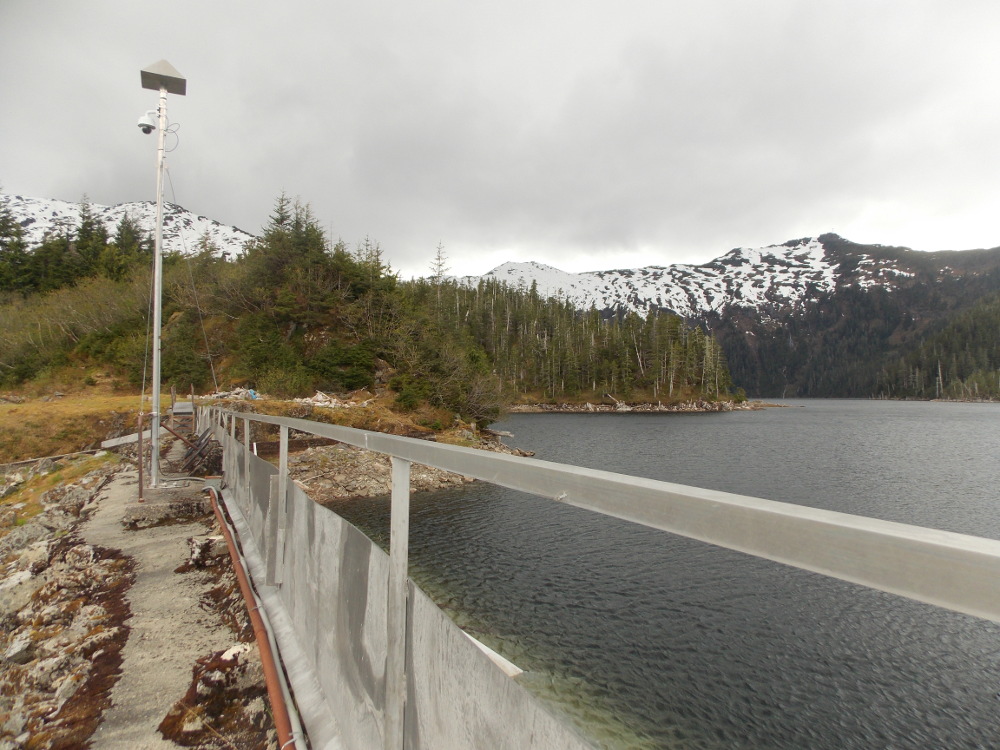
One of two potential questions on Petersburg’s October 5th ballot seeks voter approval to bond for an overhaul and boost to both hydro and diesel electric generation on the island. The local electric utility says the work is necessary to keep those power sources running but it will mean an increase in the cost of power for utility customers.
The bulk of the 7.8 million dollar bond issue would go to replacement of much of the equipment used to make power from the waters of Crystal Lake. The plant at Blind Slough dates back a century, is about 18 miles south of Petersburg, makes about a quarter of the community’s electricity and is Petersburg’s cheapest source of power.
Utility director Karl Hagerman hopes voters will agree that work pencils out.
“As long as the number make sense in allowing us to continue that legacy of Blind Slough, continue to produce low cost power out of that facility, I think it’s really in the community’s best interest to do that,” Hagerman said in a July interview.
The utility estimates it costs 1.3 cents a kilowatt hour for hydropower from Crystal Lake. The other three quarters of the community’s hydropower comes from two mainland plants owned by the Southeast Alaska Power Agency. That costs 6.8 cents a kilowatt hour. If those sources are lost and Petersburg reverts to standby diesel generators, the cost to make power here jumps to 18 cents a kilowatt hour.
In 2019 a consultant recommended the overhaul at the Blind Slough plant. And the assembly has already voted to purchase the equipment for that work, although that’s contingent on getting voter approval.
If voters don’t say yes, Hagerman saidthe utility will maintain the hydro plant until there’s a catastrophic failure.
“Hard to say when that would happen,” he said. “You know our engineering firm on that job, McMillen Jacobs pointedly said that their crystal ball isn’t that much clearer than anybody else’s but they are seeing some degradation in the facility to the point where they strongly recommended that we do something and refurbish the facility.”
Borough assembly member Bob Lynn supports passage of the bond measure. He’s also Petersburg’s voting representative on the board of the Ketchikan-based wholesale provider SEAPA. Like Hagerman, Lynn thinks its better to spend money now on the Blind Slough plant.
“I’ve read the engineer’s reports and yeah there’s a lot of questions there,” Lynn said. “It could fail at any time but it could go for a while too. But I think we’d be better off taking a positive approach here and doing it as we can without having to be a crisis mode and then costing us a lot more at that time.”
Lynn also notes the importance of the remainder of the bond, about 1.4 million dollars that would pay for an additional diesel generator in Scow Bay. Those are used when hydro power isn’t available and officials say the community is nearing the limit of its standby diesel during peak wintertime demand. Hagerman said that could lead to more extended outages as the utility tries to restore power.
“If we don’t manage to do that and a generator trips off due to it being overloaded then it’s a cascading effect and we just have to start over again from basically zero,” Hagerman explained. “And that could go on, unless we shed load, like Bob mentioned, which means making sure that some customers don’t come on, that we don’t turn them on until we get everything stable. It makes it a very long process in the middle of wintertime that’s not really an option for me. I don’t want to see us taking any longer than possible to get people’s power back on.”
Hagerman said electrical demand is rising in Petersburg. The added diesel in Scow Bay would address the short term need. The borough is also looking into the longer term, hiring a consultant to plan for diesel generation needs for the next decade.
The debt for the electrical work would be repaid by customers of the electric utility, not by property tax. And it’s expected that will require nine and a half percent hikes in the utility’s revenue this year and next. Hagerman plans to present more information what that would look like on local utility bills at upcoming assembly meetings. But he thinks local power rates will still be competitive.
“With these increases, even though they’re not insignificant to our customers in comparison to other communities we are still kind of right in the middle of the range as far as what other customers in Sitka, Ketchikan, Juneau, Wrangell pay for their power,” Hagerman said.
The utility has over six million dollars in reserves and will be using some of that to pay the generation upgrades. Another million dollars of that is held in reserve to replace a special transformer in downtown if that were to fail. And nearly two million dollars of that reserve money is kept to pay the bills in case of an emergency.









